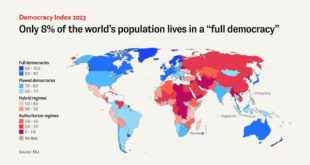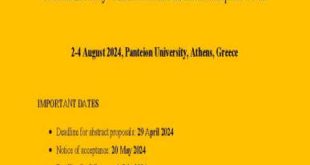There is no ‘tragedy of the Commons.’ But a tragedy of the absence of Commons-as organizations, let’s call it ‘the tragedy of uncommons’, does exist. Below, I will provide the example of the island of Ameland in the Northern Netherlands, in line with the historical examples of successful Commons mentioned by Elinor Ostrom (especially those for Switzerland). Ownership is a multi-dimensional concept. Up to the 1795 revolution, the island of Ameland, north of Friesland, was not a part...
Read More »Complexity and Econ 100
from Maria Alejandra Madi and RWER issue 106 Complexity is characteristic of a system that preserves the differentiation among its constituent elements while also preserving their identity. Complexity also implies dynamic systems, that is to say, open totalities of interrelated parts constantly changing in spacetime. The complexity of a system is related to the coexistence of intertwined parts in spacetime and complexity is intrinsic to real-world natural, economic and social processes...
Read More »The problem with economics — too much maths, too little history
from Lars Syll Mainstream economists have always wanted to use their hammer, and so have decided to pretend that the world looks like a nail. Pretending that uncertainty can be reduced to risk and that all activities, relations, processes, and events can be adequately converted to pure numbers, have only contributed to making economics irrelevant and powerless when confronting real-world financial crises and economic havoc. How do we put an end to this intellectual cataclysm? How do we...
Read More »Back to the office: a solution in search of a problem
Managers need to recognise that the best way to dissipate authority is to fail in its exercise My latest in Inside Story Authority is powerful yet intangible. The capacity to give an order and expect it to be obeyed may rest ultimately on a threat to sanction those who disobey but it can rarely survive large-scale disobedience. The modern era has seen many kinds of traditional authority come under challenge, but until now the “right of managers to manage” has remained largely...
Read More »Three principal strategies for theorizing a “new economics of ecological limits”
from Richard Parker and RWER issue 106 Back in the late 1960s, a tiny band of unconventional economists encountered an environmentalism in the midst of radical rethinking. Prompted by Carson’s Silent Spring, capitalism and its science were being accused of major crimes—against nature, our fellow species and humankind itself. Hiroshima had shattered confidence in the benignity of Progress, especially Progress through Markets and Corporate Science. Now that skepticism looked around...
Read More »Light-touch competition policy hasn’t helped Australian mortgage holders. It’s time to get tough
My latest in The Guardian Just two weeks after Prof Allan Fels reported on the extent of monopoly power and resultant price gouging, Australia’s supreme body on competition law has delivered its answer. The Australian competition tribunal has determined that the banking industry has all the competition we need and that no harm will be done by allowing ANZ to swallow one of the few competitors to the Big Four by acquiring the banking operations of Suncorp. This was the latest in a...
Read More »Ένα παλιό αλλά επίκαιρο κείμενο για την απάτη της «αξιολόγησης»
Ο όρος «αξιολόγηση» δεν υπάρχει σε κανένα θεσμικό κείμενο τόσο της ΕΕ όσο και των προτάσεων νόμου της ΝΔ και του ΠΑΣΟΚ. Αντ’ αυτού υπάρχει ο όρος «διασφάλιση ποιότητας». Είναι χαρακτηριστικά τα σχετικά κείμενα του Ευρωπαϊκού Δικτύου για την Διασφάλιση της Ποιότητας στην Εκπαίδευση (ENQA) που αποτέλεσε και τον σύμβουλο της ΕΕ στην σύνοδο του Μπέργκεν. Τα σχετικά μέτρα δεν μιλούν για την πιο εύηχη ελληνικά «αξιολόγηση» αλλά για «διασφάλιση της ποιότητας» (δηλαδή κάτι σαν ISO) και...
Read More »Distinguishing science from pseudoscience
When I was in college majoring in microbiology, we were taught that diseases like scrapie, Creutzfeldt-Jacob and kuru were caused by “slow viruses.” Over many years, it has become clear that misfolded proteins, not viruses, are the cause of these and other spongiform encephalopathies. Stanley Prusiner struggled for a long time to convince the scientific community of prions, for which he eventually got the Nobel Prize. There are many historical...
Read More »World democracy map
Call for Papers: 17th WAPE Forum, Athens 2-4 August 2024
17th Forum of the World Association for Political Economy ‘Political Economy vs Economics in a turbulent multipolar world 2-4 August 2024, Panteion University, Athens, Greece The 17th WAPE Forum will be held 2-4 August 2024 at Panteion University, Athens, Greece. It is co-organised by WAPE (World Association of Political Economy – http://www.wapeweb.org/) and GAPE (Greek Association of Political Economy – https://politicaleconomy.gr/main/en ) and hosted by the Panteion...
Read More » Heterodox
Heterodox






